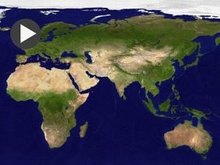
India - Weather Changing Now
India is experiencing a change in weather right now. They have been dry for the period October through December, seeing 25 per cent or less than normal precipitation in the north. Much of their main rapeseed and wheat-producing areas as well as the millet, sorghum and pulse crops have all experienced a lack of moisture.
"They do irrigate a tremendous amount of their crop - 83 per cent of their wheat crop and more than two-thirds of their rapeseed and mustard crops - so losses have not been all that great," he said. "But reproduction begins in the next few weeks, and a lot of the potential losses that may have occurred can be made up by having timely rainfall. We do see at least two more storm systems coming that will bring some moisture into the topsoil and help to support the reproductive process. So India's winter crops have a chance for some improvement, all based on early February weather."
Lerner said it could all come together and if the forecast verifies, India is going to do very well. He did note not to expect dryland crops to perform well. However, there has not been much heat which has helped crop conditions.
China - Looking Good in Crop Areas
In China, the forecast continues to be very good. He said there have been a lot of harsh conditions, including terribly cold weather and wind damage, in the far north of China near Inner Mongolia, where there's been a considerable amount of livestock loss and some wheat that's been damaged.
However, in the primary wheat and rapeseed producing areas in east central China, the weather has been just perfect. They have not seen any crop-threatening cold and have had timely precipitation. The crop is well-established and expected to perform very well in the early spring.
"Northeast China, where the corn and soybeans are produced, may see delayed seasonal rains in late May and June," he said "Once the rains kick in, they'll do fine with precipitation thereafter - maybe just a little bit of a delay in planting."
Russia - Dry, but Better Spring?
Russia has a tremendous amount of land that is still suffering from dryness from three years of drought that started in 2010.
"That area includes a very important wheat and barley production region and some sunseed areas," Lerner said. "The moisture deficits in place last fall were significant enough that they could not plant some of their crops. So they're already working against the odds of having a normal year."
The forecast is for some better weather this spring, but then Russia is likely to turn drier again in late May into June, and they'll have a period of dry-down, and stress will occur again, impacting their spring crops more than their winter crops.
Australia - Oswald Brought Much Needed Moisture
Eastern Australia has a dryness problem that has already impacted sorghum and cotton. Production is down because of reduced plantings, and yield potentials are also lower due to the lack of rain.
Recently, the remnants of tropical storm Oswald have moved down through eastern Queensland, producing widespread rain in sugar cane country. This new moisture has brought substantial improvements in that crop already.
Eastern portions of the sorghum and cotton crops are in-line to receive rain. The long range outlook puts them back into a drier bias for a while. However, moving into wheat planting season, southern portions of Australia will probably see timely precipitation and will do relatively well, Lerner said.
Europe - Recovering from Lots of Adverse Weather
Parts of Europe are recovering from adverse weather. In the southwest and the southeast corners, we have seen dryness in the past. Southeastern portions of Europe had two years of dryness that was significant. There's still a lot of moisture deficit in the subsoil, and river and stream flow seems to be well below average as well.
"If this prevails going into the growing season, the potential is that they may have problems with some of the crop not performing as well as it should," he said. "But some of the difference has been made up in the last few weeks with snow cover being widespread and precipitation coming and going fairly often. At least some improvement is going to occur there, and that is expected to continue in the spring."
In the southwest, portions of the Iberian Peninsula, Spain and Portugal were very dry last year, missing their rainy season and suffering through the summer without a lot of moisture. However, they had leftover irrigation that was sufficient to carry on normal crop development.
"It was imperative that they get a good year of rainfall this year-so far, they've done OK. It's not the best rainy season they've seen for a while, but at least it's an improvement over last year," he said. "They should go ahead and come into spring with at least the same conditions they had a year ago."
As for the rest of Europe, Lerner said everybody is plenty wet, if not too wet. There is snow on the ground everywhere across the continent, except in the coastal regions on the Atlantic side and in the Mediterranean. And the snow is going to melt. Eventually, it's going to cause a significant amount of runoff that, in combination with regularly-occurring rainfall, is likely to lead to some flooding.
"We've already seen some flooding occur in France and the UK over the past several weeks if not months, and this process will probably continue a little while longer," he said. "But places like Germany, Poland, and areas southward into the Balkan region, I don't think will have to worry too much about flooding of significance, especially not the Balkan region because of the dryness I mentioned."





